Dybuk. Rzecz o wedrówce dusz est un film ukrainien de genre Documentaire
Dybuk. Rzecz o wedrówce dusz (2015)
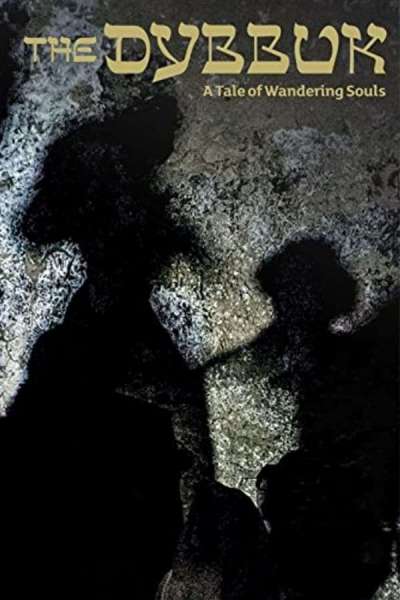
Si vous aimez ce film, faites-le savoir !
The Dybbuk. A Tale of Wandering Souls is a 2015 documentary film by Polish filmmaker and director Krzysztof Kopczyński. The film tells the story of a conflict between orthodox Jews and Ukrainian far-right activists in Uman, a city in Ukraine, just before Euromaidan protests.
Every year 30,000 Hasidim journey to Uman to celebrate the Jewish New Year at the gravesite of their holy leader Rebbe Nachman. Meanwhile, a Ukrainian far-right group erects a cross at the site of Hasidic prayers and builds a monument to Cossacks who slaughtered thousands of Jews and Poles in 1768 during a national rebellion.
The film opened the 55th Krakow Film Festival, where it received the Silver Hobby-Horse for the Director of the Best Documentary Film. The prize was awarded "for courage and non-conformity in showing an extremely complicated and universal problem of reciprocal intolerance when facing the dangers of the contemporary world." On 6th Odessa International Film Festival the film received FIPRESCI prize for a feature-length film.
Commentaires
Postez un commentaire :
Suggestions de films similaires à Dybuk. Rzecz o wedrówce dusz
Il y a 8959 ayant les mêmes genres cinématographiques, 3314 films qui ont les mêmes thèmes (dont 250 films qui ont les mêmes 3 thèmes que Dybuk. Rzecz o wedrówce dusz), pour avoir au final 70 suggestions de films similaires.Si vous avez aimé Dybuk. Rzecz o wedrówce dusz, vous aimerez sûrement les films similaires suivants :

Unsettled (2007)
, 1h20Genres Documentaire
Thèmes Afrique post-coloniale, Religion, Documentaire sur le droit, Documentaire sur la guerre, Documentaire historique, Documentaire sur une personnalité, Documentaire sur la politique, Documentaire sur la religion, Politique, Religion juive
Note73%






Budrus (2010)
, 1h10Réalisé par Julia Bacha
Origine Etats-Unis
Genres Documentaire
Thèmes Afrique post-coloniale, Religion, Documentaire sur le droit, Documentaire sur la guerre, Documentaire historique, Documentaire sur une personnalité, Documentaire sur la politique, Documentaire sur la religion, Politique, Religion juive
Note76%





Jordana Horn in The Jewish Daily Forward states that: Budrus [is] a documentary by Julia Bacha that examines one West Bank town’s reaction to Israel’s construction of the security barrier. The town, with a population of 1,500, was set to be divided and encircled by the barrier, losing 300 acres of land and 3,000 olive trees. These trees were not only critical for economic survival but also sacred to the town’s intergenerational history. The film tells the story of Ayed Morrar, a Palestinian whose work for Fatah had led to five detentions in Israeli jails, but whose momentous strategic decision that the barrier would be best opposed by nonviolent resistance had far-reaching ramifications.

Faith and Fate (2005)
, 1h47Origine Etats-Unis
Genres Documentaire
Thèmes Religion, Documentaire historique, Documentaire sur la religion, Religion juive
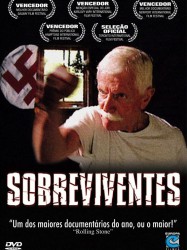
Fighter (2000)
Réalisé par Amir Bar-Lev
Genres Documentaire
Thèmes Le racisme, Religion, Documentaire sur la discrimination, Documentaire sur le droit, Documentaire sur la guerre, Documentaire historique, Documentaire sur une personnalité, Documentaire sur la religion, Politique, Religion juive, Documentaire sur la Seconde Guerre mondiale
Note73%






From Swastika to Jim Crow (2000)
, 1hGenres Documentaire, Historique
Thèmes Le racisme, Religion, Documentaire sur la discrimination, Documentaire sur le droit, Documentaire historique, Documentaire sur une personnalité, Documentaire sur la religion, Politique, Religion juive
Note80%





 , 2h2
, 2h2Origine Etats-Unis
Genres Guerre, Documentaire, Historique
Thèmes L'enfance, L'immigration, Le racisme, Religion, Documentaire sur la discrimination, Documentaire sur le droit, Documentaire sur la guerre, Documentaire historique, Documentaire sur une personnalité, Documentaire sur la religion, Politique, Religion juive, Documentaire sur la Seconde Guerre mondiale
Acteurs Judi Dench
Note76%





Quelques mois avant la Seconde Guerre mondiale, une extraordinaire opération de sauvetage a arraché 10 000 enfants et adolescents juifs au régime nazi. Rapatriés en Grande-Bretagne pour être adoptés, ils durent tisser de nouveaux liens familiaux, supporter les bombardements pour certains, aller libérer leurs propres parents restés en Allemagne. Ils ont tous d'inoubliables histoires à raconter dans ce documentaire.
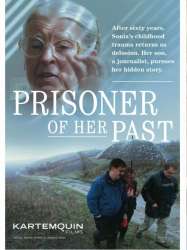
Prisoner of Her Past (2010)
, 57minutesOrigine Etats-Unis
Genres Documentaire
Thèmes Maladie, Le racisme, Religion, Documentaire sur la discrimination, Documentaire sur le droit, Documentaire sur la guerre, Documentaire historique, Documentaire sur une personnalité, Documentaire sur la religion, Documentaire sur la santé, Folie, Le handicap, Politique, Religion juive, Documentaire sur la Seconde Guerre mondiale
Note74%






Arotzim Shel Za'am (2003)
Origine Israel
Genres Documentaire
Thèmes Afrique post-coloniale, La musique, Religion, Documentaire sur le droit, Documentaire sur la guerre, Documentaire historique, Documentaire sur la musique, Documentaire sur une personnalité, Documentaire sur la politique, Documentaire sur la religion, Le hip-hop, Musique, Politique, Religion juive
Note68%





The film focuses on two young rap artists, Subliminal, an Israeli Jew, and Tamer Nafar, a Palestinian citizen of Israel, and focuses on their music, friendship, and their politicization as public figures. The film traces the relationship between Tamer and Subliminal, as the events of the Second Intifada unfold, and lets the viewer draw conclusions from the souring relations between the two as an individual representation of the polarization process which took place during these years of bloody conflict. In this aspect, the film succeeds in delivering the atmosphere of the loss of hopes for peace after the failure of the Camp David summit between Ehud Barak and Yasser Arafat and the renewed intensity of the conflict since. The film was featured in the San Francisco Jewish Film Festival.
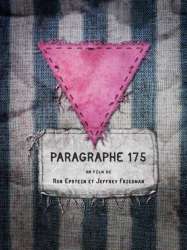
Paragraphe 175 (2000)
Réalisé par Rob Epstein, Jeffrey Friedman
Genres Documentaire, Historique
Thèmes Le racisme, Religion, Sexualité, Homosexualité, Documentaire sur la discrimination, Documentaire sur le droit, Documentaire sur la guerre, Documentaire historique, Documentaire sur l'homosexualité, Documentaire sur la religion, Politique, Religion juive, Documentaire sur la Seconde Guerre mondiale, LGBT, LGBT
Acteurs Rupert Everett
Note76%





Les homosexuels ont été comme tant d'autres les victimes du régime hitlérien. Ils étaient persécutés en vertu du paragraphe 175 du code pénal allemand. Ce paragraphe, datant de 1871, condamnait à la prison "les actes contre nature" entre hommes.
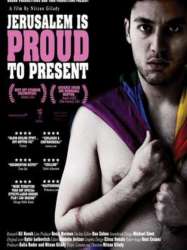
Origine Israel
Genres Documentaire
Thèmes Religion, Sexualité, Homosexualité, Documentaire sur l'homosexualité, Documentaire sur la religion, Religion juive, LGBT, LGBT et la religion, LGBT
Note74%





 Connexion
Connexion